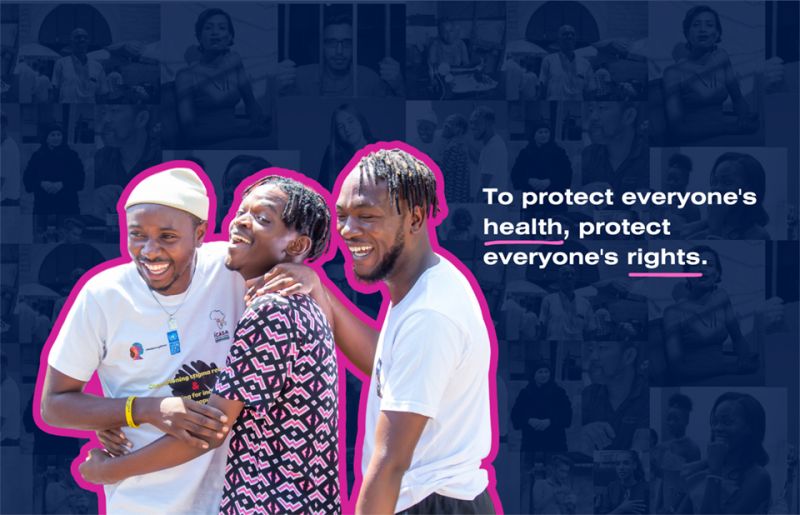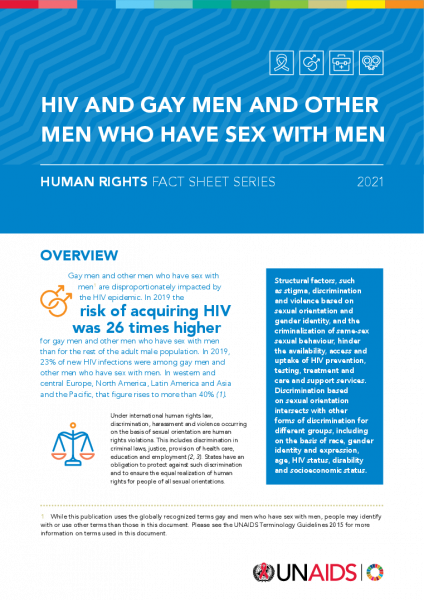UNAIDS is concerned about the impact on peoples’ health and rights following the decision of the High Court of St. Vincent and the Grenadines regarding sections 146 and 148 of the Criminal Code, which upholds discriminatory and harmful laws against LGBTQ people.
On Friday, February 16, 2024, the High Court, in an oral delivery, denied the claim by two Vincentian nationals, who reside outside of the country, that sections 146 and 148 of the Criminal Code criminalising buggery between any two persons with a penalty of up to 10 years imprisonment, violate the fundamental rights to privacy, personal liberty, freedom of conscience, freedom of expression and protection from discrimination. The Court dismissed in their entirety all claims by the two Claimants and awarded the sum of EC$7,500 prescribed costs to the Attorney General to be paid by each of the Claimants.
In the written decision published February 22, 2024, the Court in dismissing the consolidated claims of Javin Johnson and Sean MacLeish held that the Claimants had failed to establish on the evidence, a present or existing breach of any alleged rights due to lack of locus standi (the requisite standing to invoke a review by the Court) as the Claimants do not reside in the State and had not for years prior to the filing of the claims.
UNAIDS is particularly concerned that the judgment referred to protecting public health and tackling the HIV epidemic as justifying punitive anti-LGTBQ laws, because the evidence shows that such laws hinder efforts to protect public health and tackle the HIV epidemic. At paragraph 267 of the judgment the court asserted:
“to my mind the thought of a public health crisis occasioned by an unstemmed deluge of new HIV cases is a real and serious concern which reasonably justifies a public health response of the kind embedded in the challenged provisions”.
In fact, studies show that these laws have negative health outcomes. A punitive legal environment, including criminalisation of same sex relationships, drives people underground and away from vital health services, including HIV prevention, testing, treatment, and care. To achieve the goal of ending AIDS as a public health threat by 2030, it is vital to ensure that everyone has equal access to essential services without fear, stigma or discrimination.
UNAIDS has estimated that not achieving decriminalization of key populations in all countries would result in about 750 000 cumulative new HIV infections from 2020 to 2030.
The decision made in the High Court of St. Vincent and the Grenadines stands in stark contrast to the rulings in Belize, Guyana, Trinidad and Tobago, Antigua and Barbuda, St. Kitts and Nevis and Barbados where the courts ruled that laws which criminalise persons based on sexual orientation and gender identity violate the protected rights to dignity, privacy, personal liberty, freedom of conscience, freedom of expression and protection from discrimination.
Regardless of the outcome of this court decision, UNAIDS holds hope that the courts will serve as a vital last resort for social justice, the protection of human rights and the advancement of public health for improved health and wellbeing for all. UNAIDS work to end AIDS and to leave no one behind will continue in partnership with communities and with all branches of government, including the courts.
Punitive laws obstruct the end of AIDS and ultimately hurt everyone’s health. As we prepare for observance of the tenth anniversary of Zero Discrimination Day on March 1st, 2024, we pay tribute to the courage of communities, and call on all duty bearers to protect the health of all by protecting the human rights for all.
NOTE FOR THE EDITORS:
UNAIDS
The Joint United Nations Programme on HIV/AIDS (UNAIDS) leads and inspires the world to achieve its shared vision of zero new HIV infections, zero discrimination and zero AIDS-related deaths. UNAIDS unites the efforts of 11 UN organizations—UNHCR, UNICEF, WFP, UNDP, UNFPA, UNODC, UN Women, ILO, UNESCO, WHO and the World Bank—and works closely with global and national partners towards ending the AIDS epidemic by 2030 as part of the Sustainable Development Goals.
ZERO DISCRIMINATION DAY
March 1st this year is the tenth anniversary of Zero Discrimination Day. Upholding everyone’s rights is the responsibility of us all. Everyone can play a part in ending discrimination. On 1 March, and across the whole month of March, events, activities and messages will remind the world of this vital lesson and call to action: to protect everyone’s health, protect everyone’s rights. #ZeroDiscrimination




